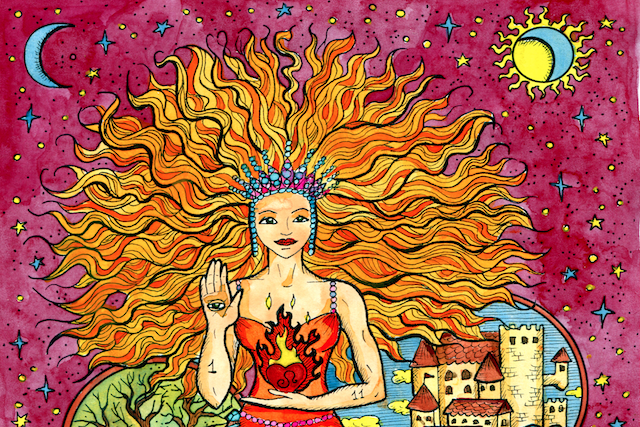
“Sometimes when you’re in a dark place, you think you’ve been buried, but you’ve actually been planted.” ~Christine Caine
The phrase “personal growth” has always felt counterintuitive to me. Personal growth feels less like growth and more like stripping away—of peeling back the expectations, fears, and shame that we’ve been conditioned with since birth. Beneath these layers lies our truest nature—our inner divinity—our most aligned selves. I view my work on this Earth as getting as close to that aligned self as I can.
Despite the barrage of positive affirmations and uplifting memes encouraging us to “live our truth,” learning to live in alignment can be deeply uncomfortable. Hundreds of requisite growing pains accompany the process. We shed skins that no longer serve us, which at first leaves us raw and exposed.
Over the years, I’ve worked to break addictive patterns and speak my truth against enormous inner resistance. When I began to live in alignment, I experienced seismic discomforts. This new territory was entirely uncharted, and with it came bouts of newfound anxiety, fear, and hyper-sensitivity.
I worried that these unpleasant emotions were signs of “doing it wrong.” Of course, judging my reactions only exacerbated my discomfort—which eventually passed, on its own, in time.
At first, living in alignment is tough. It gets harder before it gets easier. Here are eight reminders to help you trust your gut and keep going.
1. It’s normal to break up with partners, friends, and acquaintances.
Living in alignment looks different for everyone. For me, it largely meant quitting drinking, changing careers, and setting firmer boundaries around my time, space, and body. The first thing I noticed was how many of my relationships—relationships that fit like puzzle pieces with the old me—now felt inauthentic, empty, or downright wrong.
One of the most important parts of my journey was leaving relationships that no longer served me. This meant “breaking up” with four to five friends over the course of a few months, a process that left me feeling guilty and lonesome at first.
The flipside? Now, relationships formed on the basis of people-pleasing, codependency, obligation, and guilt are not a part of my life. These “breakups” leave room for authentic, nourishing, reciprocal relationships to blossom. Be patient as they form.
2. It’s normal to feel a boatload of guilt.
For me, living in alignment meant giving up old people-pleasing behaviors. Suddenly, I wasn’t the person who others could count on to go along with the flow. I spoke up. I set boundaries. I stayed in when I wanted to stay in, cancelled plans when I needed to, and set non-negotiable expectations for my relationships.
In other words, I no longer prioritized other people’s comfort over my own feelings.
If you’re not used to putting your own needs first, doing so can spark an avalanche of guilt. You might feel unforgivably selfish. You might wonder if you’re a bad friend/mother/colleague/[insert role here].
Guilt in the early stage of living in alignment is totally normal. Understanding this helps you to notice and accept the guilt instead of reacting to it. Talk through it with trusted friends, a coach, or a therapist. Learn what it feels like in your body. Write about it in your journal. Over time, meeting your own needs will feel second-nature.
3. It’s normal to feel hyper-sensitive and/or need more solitude.
Giving credence to my feelings, emotions, and needs was like breaking a dam. Once they started flooding, they keptflooding. And flooding. And flooding.
By honoring my anger, I began to realize how painful certain relationships felt. By honoring my need for time and space, I began to realize how energetically draining some environments were. By honoring the ebbs and flows of my body, I began to notice when I needed more sleep or a change to my diet.
As a result of these sensitivities, I needed more time to myself, more naps, fewer plans, and more space to process my emotions via journaling and meditation. At first, this baffled me. I thought living in alignment with my inner self would make me feel more resilient…. not less!
Keep in mind that what feels like “hyper-sensitivity” may just be “sensitivity,” and it is a completely normal reaction. You are giving your feelings and needs space to surface, maybe for the first time ever. You might be surprised by how many feelings you have—or by how forcefully they arise—when they’re no longer under lock and key.
4. It’s normal to freak out after setting a boundary or speaking a difficult truth.
Once, shortly after I’d made the decision to quit drinking, a housemate of mine made a rude, taunting comment about my sobriety. Instead of brushing it off, I turned to him and said forcefully, “That was really inappropriate. I don’t appreciate it.”
I had never stood up for myself so confidently. I went upstairs to my bedroom with a grin, feeling righteous and strong. Five minutes later found me hunched over in a sobbing fit. Everything in my body screamed, “You are mean! You’re an *sshole! Take it back!”
In a frenzy, I ran down the stairs, threw open my housemate’s bedroom door, and gasped “I’m-so-sorry-I-said-that-I-got-out-of-hand-Please-forgive-me.” He accepted my apology, bewildered, and thirty minutes later, back in my bedroom, I threw up my hands in frustration.
Yes, I redacted an appropriate boundary. Yes, I confused the hell out of my housemate. And yes —it was progress.Baby steps, baby.
It’s totally normal to freak out after setting a boundary. If you grew up in an environment where you were punished or neglected when you expressed your true feelings, learning the art of honest expression is a radical act. In adulthood, your heart, mind, and nervous system is learning how to process, hold, and express difficult emotions. Fear may accompany this process, especially fear of retaliation or fear of abandonment.
Remember: the simple act of setting a boundary may feel like an enormous emotional upheaval. You’ve just done some serious emotional work. After setting a challenging boundary, hold yourself with compassion in those moments and give yourself permission to rest and recuperate. With time, your muscle of authentic expression will strengthen.
5. It’s normal to experience previously unaddressed trauma.
When I lived out of alignment, I drank too much, slept around, and chased the reckless highs of my compulsions. In hindsight, it’s easy to understand that, because my reality was so painful, I used any means possible to escape it. Unfortunately, when I began to live in alignment, I realized that the means I had used to numb my pain were painful, too.
My body and heart carried the scars of my compulsions gone awry. Living in alignment meant giving those buried pains and traumas voice. I was bewildered when my healing journey became home to unexpected triggers, panic attacks, and hypersensitivities. At first, I felt more broken than I’d felt before.
Little did I know that part of healing it was feeling it in the first place—something I’d never let myself do. As they say: it gets dark before the dawn.
Especially if you find yourself experiencing previously unaddressed trauma, seek support from your partner, friends, or a therapist. Letting your trauma surface and heal allows you to integrate the many parts of your story that may have been disparate and disconnected before. This is part of your journey to wholeness.
6. It’s normal to get angry AF.
For years, I shrunk myself for the sake of others’ comfort. I hid my voice. I settled for less. I participated in imbalanced relationships. I stomached unkindness.
When I began to live in alignment, I started to see with new eyes all the s%&# I’d settled for over the years. I became resentful and enraged. I felt white-hot anger toward the individuals who had taken advantage of me.
Like a captive animal released from her cage, I pounced with a vengeance. I vented to my friends. I shook my fist. I wrote searing poetry and wrathful songs. I let it out.
That anger was holy. It was the righteous indignation of my innermost self coming alive. Over time, feeling it and expressing it led me to an equilibrium: I could hold my anger while also understanding the part I’d played in subjecting myself to these toxic patterns.
Honor your anger. It will not annihilate you. The more familiar you become with your resentment, the more you can use it as a signpost to set boundaries in the future.
7. It’s normal for your dreams to shift rapidly.
As we strip away our conditioning and get in touch with our innermost selves, dreams that others have for us lose their glossy appeal. We may find ourselves bucking opportunities for fame, fortune, and legacy in favor of dreams that illuminate us from within. Our intrinsic desires become paramount.
That sounds awesome—in theory. But when it happened to me, I had a major identity crisis. I had spent countless hours, thousands of dollars, and a college education following a very specific dream of a career in politics. For years, I’d told anyone who would listen that my dream job was a seat in the Senate. Without this societally sanctioned goal, who would I become?
Especially for those of us who live out of touch with our innermost selves, we rely heavily on external roles and rewards to feel a sense of purpose and identity. As we begin to live in alignment, those external rewards begin to matter less. Sometimes, we realize we never really wanted them at all.
It’s normal if your dreams, desires, career, or values shift rapidly. It’s normal if your work suddenly feels deflating, boring, or downright awful. It’s normal if you suddenly feel the need to quit your venture or back out on your business plan. It’s normal to cease your involvement in organizations, boards, or volunteer roles that no longer resonate with you.
You’re not being impulsive. You’re not “wasting” anything. You’re not crazy. You are adjusting your external world to align with your newfound inner world — and that is an act of self-love and self-respect.
—
Despite my work as a life coach and my proclivity for collecting self-help books, the best piece of advice I’ve ever gotten is, simply: You’re right where you’re supposed to be.
So often, we get in our own way by judging our (very valid) reactions to unfamiliar circumstances. In a culture that lauds the shiny, happy, green-smoothie version of personal growth, we forget that self-care can be fearful, anxious, and downright painful.
Keep going. That fear, anxiety, and pain is all part of your process. Hold it with compassion and watch who you become when you reach the other side.
About Hailey Magee
Hailey Magee is a Codependency Recovery Coach who helps individuals conquer people-pleasing, set empowered boundaries, and master the art of speaking their truth. She has worked with over 100 clients from the US, Canada, Ireland, France, South Africa, and more. Sign up for a complimentary consultation to learn how coaching can help you live from a place of authenticity and inner freedom. You can follow Hailey on Facebook and Instagram, or visit www.haileymagee.com.
- Web |
- More Posts













 Though I run this site, it is not mine. It's ours. It's not about me. It's about us. Your stories and your wisdom are just as meaningful as mine.
Though I run this site, it is not mine. It's ours. It's not about me. It's about us. Your stories and your wisdom are just as meaningful as mine.
This article is EXACTLY what I’ve been going through since February. I spent years shrinking myself and people pleasing for others and my entire life having my authenticity punished by authority figures. When I finally decided to listen to my inner self because I had felt so off for so long, I had panic attack after panic attack. I felt lost and afraid. Vulnerable and raw. And I had no idea why. I decided to talk to a therapist and take a hiatus from school. I’ve learned so much about myself. I felt that white hot anger at the others who had judged me for doing what was right for me at the time. I’m learning to set boundaries right now and I’m teaching myself to work through the guilt I feel for standing up for myself. I’m shedding the problems of others. It doesn’t always feel amazing, but I have so much clarity and perspective. I feel like I lived in the dark for so long unwilling to see truth. In what feels like a short time, I have changed into a new person. Thank you for writing something I relate to so well!
I really hear you, @cla35t:disqus. The journey can leave us feeling so raw. We’re opening ourselves up to layers of grief and mourning for all the years we made ourselves small. The journey is hard, but beyond worth it. Thank you for sharing and relating! <3
Wow. Amazing! I can’t put into words how grateful I am to you for sharing this! You’ve described the exact process and symptoms I’ve been going through in the last 11 months! You really helped me see clearer. Paradoxically, you made me feel safe in this chaos that I am going through right now! And the words you used were so on point! And I thought I was the only one going through this kind of crisis. Thank you! 🙏
@DanutTiprigan, it’s really beautiful to hear your words. I wrote this piece for that EXACT reason: I felt so alone in this process, and after speaking to a few trusted friends, realized the difficulty was far more common than I thought. We are not alone! Sending strength and goodness on the path forward.
One of my favourite posts. I have spent the end of 2018 and the entire year shedding. Rome wasnt built in a day so I am alot more easier on myself when I realise I’ve taken a step back and people please. I just ended a situation that I felt wasnt right for me. I no longer choose to settle for “nice” or “good enough” because of how it looks. I deserve better. And my body deserves better. I’m sensitive. I feel energy. I’m in tune with my body when something doesnt feel right. I dont want to continue abusing myself. Thank you for sharing this. Came at the right time.
@disqus_ZVScTT8FbW:disqus, kudos for listening to yourself and ending the situation that didn’t serve you. This type of thing is real “work” — a muscle that gets easier with practice. Thank you for sharing some of your story.
Thank you Hailey 💜 Very well put and your words fed my soul today!
Thrilled to hear that, @disqus_ELEvxXc2XX:disqus! Thanks for your kindness!
Thank you Hailey! This sums it up so well. I love how aligned this work can be with 12-step work, both of which have changed my life over the last year. I’m finally starting to take up space! What a great feeling!
Katie, love the way you say “I’m finally starting to take up space.” Hell yes to that! I’m involved in 12-step work too; both have changed my life. Sending you big love on the journey!
This was an amazing read, I have felt all these things and it’s so great to finally understand that it is normal. No one talks about the pain you experience during alignment and this helped me understand myself much more, thank you ❤️
Thanks for your kindness, Susana. Yes — we are absolutely not alone in these growing pains. Sending you strength as you continue to align and speak your truth!
I loved loved loved this post, it made me feel normal again! It described everything I’m going through and had some amazing tips thank you 🙏
Thanks, Laura! It is relieving to remember that we are not alone in this important inner work! 🙂
This is very good
I experienced a lot of that myself
It proves its authenticity to me
Thanks for sharing so well-writtenly
Very structurized. Good read.
Didn’t find every single detail the same way. It kind of shines out of those lines that you’re different than me. E.g. I didn’t get particularly angry – I tend(ed) to be angry anyways.
Process well-described
Edit: Didn’t notice you’re not labeling this. But you are describing a healing process.
Thanks for sharing your take, @romanfeldhoff:disqus! Definitely describing a healing process, and an alignment process, as well.
Thank you Hailey for writing this and sharing with us. I have so much of this going on right now & it’s nice to know it isn’t just something about me that makes people’s expectations so difficult. It isn’t right to follow what they want me to be, but it is right to just be me.
@rooboo2015:disqus, thanks for sharing some of your experience. Living in alignment with your truth and bucking others’ expectations can be tricky — but, I believe, ultimately far more rewarding. Sending you strength on the journey!
Thank you for this post, I really need this. However i’m not sure about my enlightenment but this days I lose everything I want & everything change around me. My job, Career, religion, family, friends and I have panic attacks and trauma comes up to surface. I feel more shame & guilt however I have a life coach but I was about to give up everything before your post
Thanks again
Thank you for sharing your experience. Hang in there, @gogoseoul:disqus. When we have the courage to share our experiences, we realize that there are SO MANY other folks who feel exactly as we do. Sending you strength and warmth on the journey ahead.
Hello,
I just read your work. Its fantastic. I had a lot to learn from it, but I feel when you use anger to shoo away others who has not shown you kindness or hurted you, you cannot be in your mind the fullest. I meant the replies or actions can’t be controlled. Then you will end up regretting it. In that instance when your friend made a comment on your sobriety, you could have just smiled and not care about what he said. He might have thought about you anything but again its not affecting you. So don’t care about others opinion. Isn’t it? This goes in accordance with the Buddhist ways.
OMG, Yes, Yes, Yes. Thank you for sharing this. I’ve been “stuck” and not being true to myself, self-sabotaging, and not speaking up for myself. Why is it we worry more about others thoughts and feelings than we do our own? I’m definitely a work in progress and this post really resonated with me. Thanks again for sharing.
Thank you for sharing where you’re at in your journey, @LoriR13:disqus! It takes time and practice to learn to prioritize our own needs and feelings. Sending you strength on the journey!
Holy s**t, man. Hailey, you have spoken directly to me with this article and put what I’m going through right now into a precise, relatable, easy read that is so freaking open, clear and encouraging. Thank you for this. Thank you, thank you, thank you. It has been such a dark day for me, but I know light is coming.
@disqus_c6auS7iT6F:disqus — thank you so much for your words. I’m so glad the piece resonated with you — I wrote it because it was what I most needed to hear! We’re on the same journey. Keep the strength! <3
Hi Hailey, this is Thomas. We always live for others, we always try to make others people happy. This is wrong. This is our life and we should have the full right to live it as we want to live it. But what we do, we always try to make other people happy. This post is really an eye-opening post for all of us who have been living their lives like this. So stop doing this and live your life for yourself, not for others. Thanks, Hailey for the efforts you have put to bring us this knowledge. Thanks, Thanks, and Thanks.
I can’t even tell you how much I appreciate this. The relationships, the anger, the fact that ‘alignment’ doesn’t always feel aligned. It is hard to find validation for this experience or any expanded understanding of what it is, as it is countercultural, or anyway begins paddling away from reality as it’s been defined in search of the truer one. The deeper rules. It is not easy, and many people will not understand or like it, so support can be hard to come by. So thank you.
Thanks for the kind words, @michellereiter:disqus. So glad you found resonance here <3